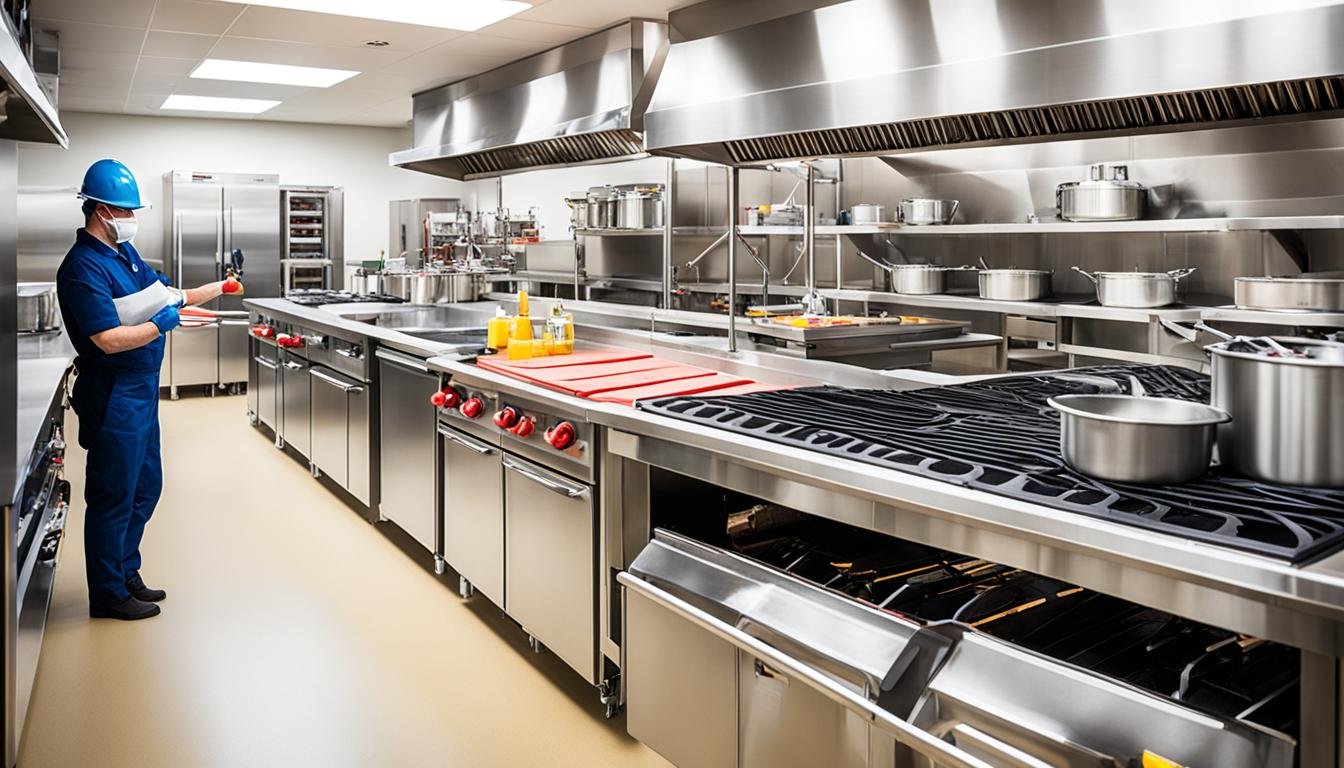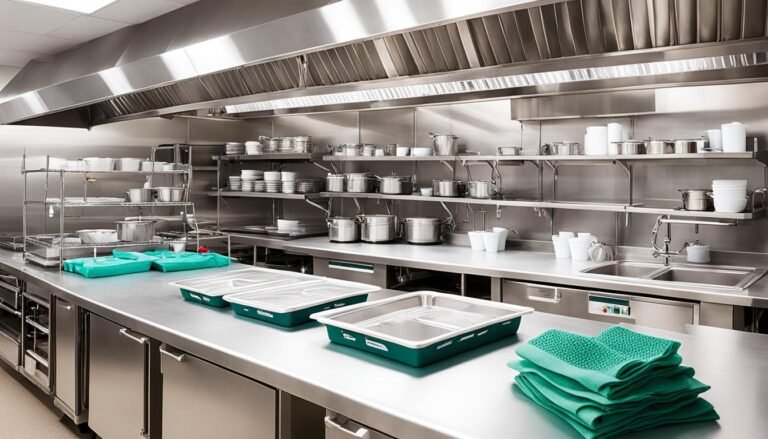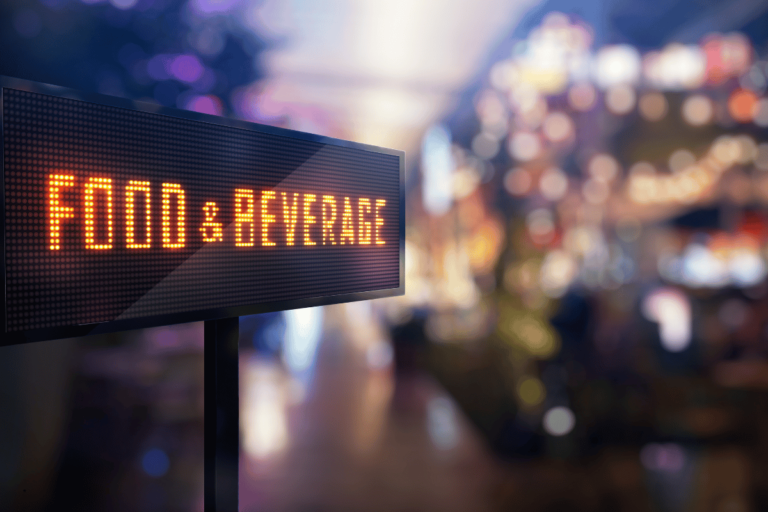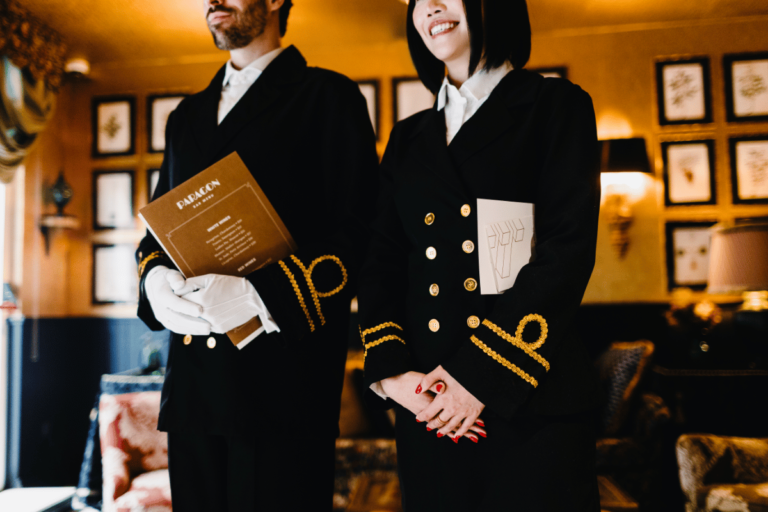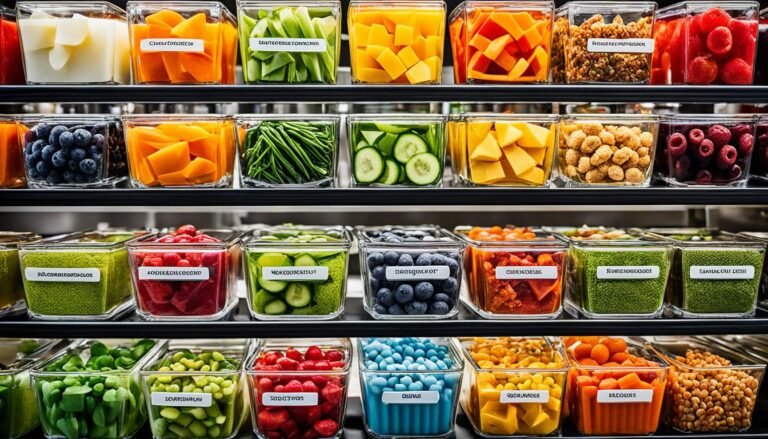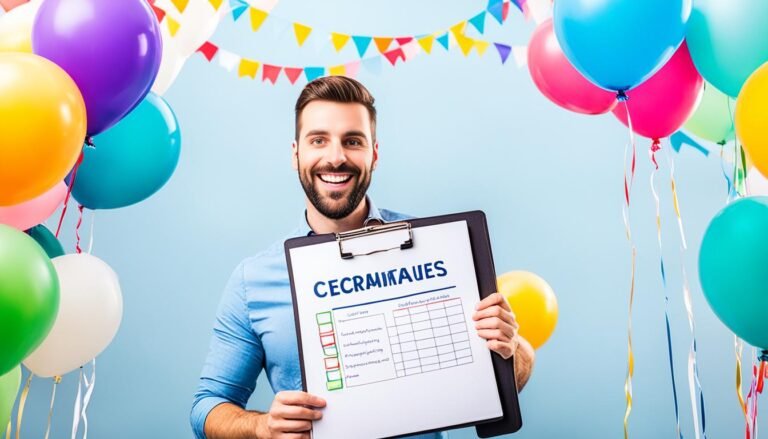Essential Health and Safety in Hospitality Tips
Welcome to the exciting world of hospitality. Here, taking care of guests is everything. This industry includes everything from fancy hotels to busy restaurants. It’s all about making memories and keeping everyone safe and well.
Now, imagine being Sarah. She works at a top hotel, always making sure guests are happy and safe. One day, a visitor from overseas started to look really sick. Sarah, sharp and caring, saw this. She knew what to do, keeping the sick guest away from others until doctors could help.
Sarah’s fast actions kept everyone else well. She showed how important following health and safety rules is. Because of her, guests and coworkers stayed healthy, and the trust in the hotel grew stronger.
But health and safety actions in the hospitality field aren’t just about quick fixes for problems. They include setting health rules for the workplace, training staff on how to keep everyone safe, and talking openly with guests. This creates a safety culture. In this article, we’ll share tips for keeping health and safety top-notch in your business.
Key Takeaways:
- Health and safety are crucial in the hospitality industry to ensure the well-being of both employees and guests.
- Implementing proper workplace health guidelines and protocols is essential for creating a safe environment.
- Training staff on safety procedures and improving communication with guests can help build confidence.
- Collaborating with trusted hygiene brands and leveraging technology can enhance health and safety measures.
- Transparent room cleaning practices and visible safety measures are key to guest confidence.
Update Cleanliness Protocols
High cleanliness standards are crucial for guest safety in the hospitality industry. Effective protocols, including hotel and restaurant standards, build trust and follow safety rules.
Key to this update is the regular sanitization of surfaces and public spaces. This means cleaning doorknobs, elevator buttons, and more often. It kills germs and keeps things safe.
Also, it’s important to have top-notch food safety. This protects both guests and staff. It means preparing food in clean areas, checking ingredients are fresh, and cooking at safe temperatures.
Staying informed on the latest health and safety advice is vital. Hospitality places should look to health authorities like the CDC and WHO. They give info on staying safe in the industry.
Big names in hospitality have already set high standards for cleanliness. For example, IHG’s Clean Promise and Hilton’s CleanStay are both solid programs. They ensure guests’ safety with top cleaning procedures.
“Our priority is to provide a safe and clean environment for our guests. We follow strict hotel safety protocols to maintain the highest standards of cleanliness.”
Improving cleanliness doesn’t just keep guests healthy. It also makes their stay better by giving them peace of mind. Prioritizing safety makes businesses more respected, keeps guests coming back, and their business thriving.
Comparison of Leading Cleanliness Protocols
| Brand | Highlights |
|---|---|
| IHG’s Clean Promise | Reflects advice from global health authorities; thorough cleaning protocols |
| Hilton’s CleanStay | Enhanced cleaning and disinfecting procedures for guest safety |
| XYZ Hotel’s SafetyFirst | Stringent cleanliness protocols; adherence to restaurant health standards |
Improve Communication with Guests
Clear and easy-to-understand communication is key to making guests feel safe. It’s about sharing information on safety in a way that’s honest and makes them feel secure. Sharing safety updates helps guests feel cared for and eases their worries.
Welcoming Guests with Personalized Letters
Personalized welcome letters from the hotel’s top boss are a great start. They make guests feel at home and informed about safety plans. This shows the hotel is serious about guest well-being.
“At Hotel Amethyst, we are committed to ensuring your safety and well-being during your stay. Our dedicated team has implemented strict health and hygiene protocols in accordance with guest safety regulations. Rest assured, your comfort and security are our top priorities.”
Utilizing QR Codes for Seamless Information Sharing
Placing QR codes around the hotel is a smart move. It lets guests get key info fast with just a scan. They learn about cleaning rules and more without needing papers.
This method is handy and keeps things touch-free. Guests stay in the loop about their safety without hassle. It’s a win for everyone.
Enhancing Guest Safety with Effective Communication
Better talking to guests helps the whole industry stay safe. Welcome letters and QR codes inform guests about safety steps. They boost trust and keep everyone at ease.
When guests understand the safety steps, they love their stay more. Happy guests recommend the place to friends. Good talks make for great stays and loyal customers.
Training Staff on Safety and Security
Having well-trained staff is key to a safe hospitality industry. It’s important to teach them wellness and safety. This ensures everyone’s safety, from the employees to the guests. Businesses should offer trainings on how to keep things clean and safe. This way, staff know how to share these rules with guests.
UKHospitality offers great training. Their courses help those on the front line in hospitality. They learn about safety, hygiene, what to do in an emergency, and how to serve customers well. Everyone gets the skills they need to keep everything safe.
But, it’s not just about training. Employers should also care about the staff’s well-being. This means encouraging a good work-life balance and giving mental health support. When employees are happy and healthy, they work better and keep the place safer.
So, putting effort into safety and wellness pays off. It makes for a team that’s ready and eager to keep the place safe. And that’s good for guests and staff alike.
Key Benefits of Safety Training and Employee Wellness Practices:
- Improved compliance with safety regulations
- Enhanced communication of safety policies to guests
- Reduced workplace accidents and injuries
- Increase in employee morale and job satisfaction
- Establishment of a culture of safety and well-being
“Safety and security are paramount in the hospitality industry. By providing comprehensive safety training and prioritizing employee wellness, businesses can ensure a safe and secure environment for both employees and guests.”
| Training Programs | Course Topics | Benefits |
|---|---|---|
| UKHospitality | – Safety protocols – Hygiene practices – Emergency response – Customer service |
– Equips employees with necessary skills – Enhances compliance with safety regulations |
Ensuring Guest Confidence Through Room Cleaning Practices
Hotels must be clear and detailed about their cleaning methods to make guests feel safe. They use strong cleaning measures to guarantee a clean and healthy space for everyone.
Hilton’s CleanStay is a great model for this. They remove used items, clean everything with top-grade products, and disinfect often-touched areas. This way, they make sure their rooms are as clean as can be.
A special part of Hilton’s program is the use of room seals. These seals show guests the room has been deep cleaned. It lets guests know the hotel cares about their well-being.
Other hotels should adopt cleaning steps like these. When they clearly tell guests about their cleaning plans and show proof of a clean space, guests feel more secure. It makes their stay better.
Cleaning rooms well is key to keeping guests safe. With detailed cleaning plans and innovative programs, like Hilton’s CleanStay, hotels can give guests confidence. They can enjoy their time without worrying about cleanliness.
Enhancing Safety Measures with Technology
Hotel technology and touchless systems can make the hospitality industry safer. They help reduce the need for contact, lowering risks for everyone. By using new tech, hotels give guests more control over their stay. At the same time, they boost safety.
A good safety method is to use mobile check-in and check-out. With this, guests handle everything on their phones. They don’t need to meet someone at the front desk. This makes things smoother and safer for everyone.
Another smart tech is digital keys. They let guests unlock their rooms with their phones. This cuts the risk from sharing keycards. It also means guests don’t have to carry keys around.
Adding voice-controlled lights and AC in rooms is also helpful. Guests can adjust settings without touching anything. This lowers touchpoints and makes everything easier for guests.
It’s also smart to offer ways to pay without using cash or cards. Mobile wallets and QR codes do this. They make payment easy and safe for guests and staff alike.
Wyndham Hotels & Resorts is one brand using a lot of touchless tech. Their app does things like mobile check-in and using your phone as a room key. These tools make staying at Wyndham safer and more enjoyable.
With safety and tech together, the hospitality world can be cleaner and safer. These new ideas protect against illness, while also giving guests a better, more personal experience.
Benefits of Enhancing Safety Measures with Technology:
- Minimizes contact and reduces potential risks
- Streamlines the check-in process and enhances guest experience
- Eliminates the need for physical keycards and simplifies room access
- Improves overall hygiene by reducing touchpoints
- Provides a seamless and intuitive guest experience
- Offers secure and contactless payment options
Implement Visible Safety Measures
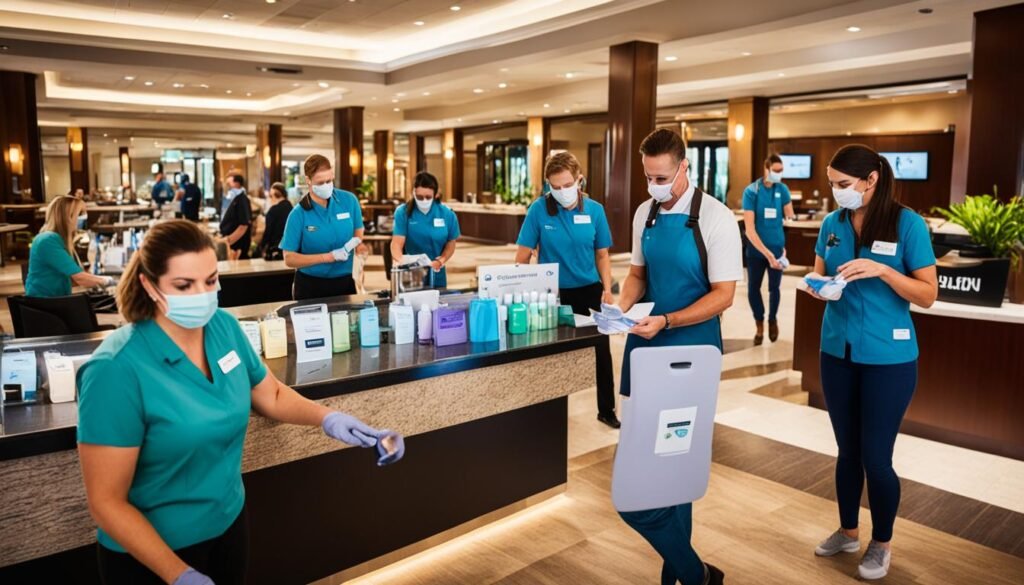
One key way to keep guests safe in the hospitality industry is by using visible safety steps. These steps enforce social distancing and make the place feel safer. Now, let’s see some good measures to use:
Plexiglass Separators
Putting up plexiglass at touchpoints helps a lot. It’s good for front desks, check-in areas, and places where people eat. This glass stops direct contact and makes folks feel safe.
Floor Markers
Using floor markers is another smart move. They keep people a safe distance apart in lines and near elevators. With clear signs, guests know how to get around while staying safe.
Staff-Managed Capacity Control
Keeping track of how many people are in a space is very important. Staff should watch how many folks go in and out of places like dining spots or meeting rooms. This helps keep social distances intact.
By using the right safety tools, hospitality spots become safer. They let guests know their health is the main concern. It also helps to tell event planners about these safety steps and use tech to plan events better.
| Plexiglass Separators | Floor Markers | Staff-Managed Capacity Control |
|---|---|---|
| Helps minimize direct contact between guests and employees | Allows guests to adhere to social distancing guidelines | Ensures shared spaces do not exceed maximum capacity |
| Acts as a physical barrier, reducing the risk of transmission | Provides clear visual cues for navigating shared spaces | Enforces social distancing measures |
Partnering with Hygiene Brands
Working with well-known hygiene brands is a big step for keeping guests safe. It also boosts their confidence. Hotels and restaurants can learn a lot and find new ways to keep things clean. They get to use the best methods recommended by health experts worldwide.
In the hotel business, two partnerships show how important hygiene is. The IHG Clean Promise and Hilton working with RB, the company behind Lysol and Dettol, stand out.
IHG Clean Promise
The IHG Clean Promise was made with big names like Ecolab and Cleveland Clinic. It offers many ways to keep guests safe. Working with top partners shows IHG’s goal is a very clean and secure place for everyone.
Hilton’s Collaboration with RB
Hilton joined forces with RB to develop better ways to keep things clean. They use RB’s knowledge to improve their already high standards. Hilton really works hard to offer top cleanliness and safety for guests.
These teamwork examples show how valuable big hygiene brands are in the hotel world. Using their know-how helps hotels and restaurants make their places cleaner and more trusted by guests. They become much safer places to be.
Conclusion
Staying safe in the hospitality industry means always learning and talking. Use good plans to keep employees and guests safe. With these tips, hotels and restaurants will be places of health and comfort.
Keep rules for clean spaces up to date and share them with everyone. Train your team on how to stay safe. Use new tech and clear signs to show safety matters. This builds trust with visitors.
Working with top cleaning companies can make your place even safer. By doing this, hotels and restaurants will make sure everyone has a great and safe time.
FAQ
Q: What are some essential health and safety tips for the hospitality industry?
A: Updating cleanliness protocols and ensuring staff practice them is key. It’s important to communicate well with guests. This can include using technologies for safer stays.
Provide visible safety measures like plexiglass and floor markers as well. Partnering with hygiene brands helps too.
Q: How can I update cleanliness protocols in my hotel or restaurant?
A: To update cleanliness protocols, start by sanitizing often-touched spots. Make sure to follow food safety rules closely. Look to authorities’ guidelines for more tips and tricks. Check out initiatives like IHG’s Clean Promise for great ideas.
Q: How can I improve communication with guests regarding safety protocols?
A: Improving safety info means being clear and thorough. Welcome letters and QR codes help a lot. They make guests feel safer.
Q: How can I ensure that my staff is trained on safety and security protocols?
A: Training staff on safety is vital. Use dedicated sessions to improve their safety skills. Also, look to places like UKHospitality for courses. These ensure everyone knows how to keep guests safe.
Q: What can I do to ensure guest confidence through room cleaning practices?
A: To boost guest confidence, make cleaning visible. Programs like Hilton’s CleanStay are great examples. They involve deep cleaning and use room seals to show when a room’s ready.
Q: How can technology be leveraged to enhance safety in the hospitality industry?
A: Using tech can make places safer. Options like mobile check-in and room access are good. Wyndham Hotels & Resorts offers a new app with these features.
Q: What are some visible safety measures that can be implemented in the hospitality industry?
A: Place things like plexiglass and markers for distancing to show safety steps. This includes giving event planners guidelines. They can use tools to make sure events feel safe.
Q: How can partnering with hygiene brands enhance guest confidence?
A: Work with top hygiene brands to make guests feel secure. Trusted brands provide up-to-date safety measures. Programs like IHG Clean Promise and Hilton’s work with RB do this well.
Q: How important is ongoing training, communication, and implementation of protocols in maintaining health and safety in the hospitality industry?
A: Regular training, talking to guests, and using new safety tech is vital. This creates a safe environment. For both your team and visitors.

